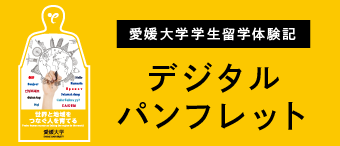Study Abroad Consultation
At the Organization for the Promotion of International Collaboration, faculty members in charge of study abroad counseling are available.
For consultations, appointments for meetings, etc., you may contact the faculty member in charge directly. For more information, please contact the International Relations Division.


Frequently Asked Questions
◎Short-term Study Abroad Programs
Students who wish to study abroad for a short period can participate in short-term study abroad programs organized by faculty members. Most of these programs last less than one month and are primarily focused on cultural training or fieldwork, such as interacting with local students and experiencing the culture, or on language training at a language school. The destinations are mainly partner institutions or related organizations overseas. Many programs are supervised by faculty members, making them accessible for students going abroad or studying overseas for the first time. Some of these programs are officially registered courses, which means that students may earn academic credit.
◎Language Study Abroad
This type of study abroad is conducted individually. Students usually stay with a host family (or in a dormitory) and attend language schools, which may be affiliated with a university or privately run. The length of stay can range from as short as two weeks to as long as six months to a year. Even when studying at a language school affiliated with a partner institution, the language school is often administered by a separate organization, and therefore all tuition fees and related expenses must be paid privately. Nevertheless, if students fulfill the required number of study days and receive an official transcript, credits from Ehime University may be granted, even in the case of privately funded language study abroad or study at a non-partner private language school.
◎Long-term Study Abroad (Exchange Programs)
This is an individually conducted study abroad program in which students pay tuition to Ehime University and study at a partner university for a fixed period (typically six months to one year). Since tuition continues to be paid to Ehime University, there is no need to pay tuition to the host institution. Additionally, students are considered enrolled at Ehime University during their exchange, so a year abroad does not delay their academic progress. However, some exchange programs require a high level of language proficiency, and official proof of language ability (such as TOEFL or IELTS scores) may be necessary. Therefore, it is important to plan and prepare early. Credits earned at the host institution during an exchange program may be transferred to Ehime University after review in accordance with faculty regulations.
The destination we recommend for study abroad changes from person to person.
In fact, there is no one place that is “the best place to study abroad! There is no one place that is “the best place to study abroad”. The “good place to study abroad” for you will depend on what you are looking for in a study abroad program.
What is the purpose of your study abroad, when and how long you want to study abroad, how much you can spend, and which country and institution you want to study abroad in? First of all, from the myriad of options available, you should consider for yourself what your purpose of studying abroad is, what form of study abroad will best achieve your purpose, and what conditions are essential for you.
It varies depending on the destination of study abroad.
First, you should consult with the “Study Abroad Advisory Center” after you have decided on a destination. In addition, no matter what form of study abroad you choose, you will need to pay for transportation to and from your destination, living expenses including housing at your destination, and tuition fees. Only in the case of exchange students, you will pay tuition fees to Ehime University, but otherwise you will need to pay tuition fees to the educational institution where you will study. You will also have to pay for various procedures even before your departure, such as passport and visa application fees, language test fees to prove your language proficiency (including transportation and accommodation to the test site), and overseas travel insurance costs.
It is a very narrow gate, but there are some.
Some of the overseas study programs offered at Ehime University come with scholarships provided by JASSO (Japan Student Services Organization) or by the university itself. However, the amount and availability of scholarships vary by academic year, and in many cases, selection is required. In addition, there are external scholarships such as Tobitate! Study Abroad JAPAN, but all application forms and procedures must be completed by the students themselves. One of Ehime University’s original scholarships is the Emika Yume Fund, which is supported by donations from the general public, private companies, the Ehime University Alumni Association, alumni associations of each faculty, and supporting organizations. Students participating in short-term study abroad programs may receive between 20,000 and 50,000 yen, depending on the destination. Students taking part in long-term exchange programs may receive a monthly stipend of 20,000 to 50,000 yen (up to a maximum of 300,000 yen). In addition, scholarships are also available from public foundations and private companies, providing wide-ranging support for students’ study abroad opportunities.
Some exchange programs, such as the Exchange Program, allow students to study at community colleges and other institutions overseas while still enrolled at Ehime University, but for language study abroad, some students take a leave of absence from Ehime University to study abroad. During the leave of absence, students do not have to pay tuition to Ehime University, but since it is not counted as days of enrollment, graduation will be postponed. Credits may be awarded for studying abroad during a leave of absence, so please come to the Study Abroad Advisory Office as soon as possible to discuss your specific study abroad plans and credit accreditation.
